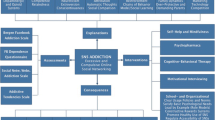Abstract
This case series includes innovative information regarding the relationship between Avoidant/Restrictive Food Intake Disorder and the recently formulated diagnosis of Internet Gaming Disorder. The series illustrates two clinical cases in which both disorders were simultaneously recognized during diagnosis and treatment. Both disorders were utilized by patients as maladaptive coping strategies in efforts to avoid emotional distress and are potential risk factors that interfere with physical and mental health functioning. This case series highlights the unique relationship between these disorders and the compounding contribution of these two risk factors to poor physical and mental health outcomes, which is a unique contribution to the eating disorder literature.
Level IV Evidence obtained from multiple time series with or without the intervention, such as case studies.
Similar content being viewed by others
References
American Psychiatric Association (2013) Diagnostic and statistical manual of mental disorders, 5th edn. American Psychiatric Association, Washington
Pitt PD, Middleman AB. A focus on behavior management of avoidant/restrictive food intake disorder (ARFID): a case series. Clin Pediatr (Phila). 2018;57(4):478–80. https://doi.org/10.1177/0009922817721158
Norris ML, Spettigue WJ, Katzman DK (2016) Update on eating disorders: current perspectives on avoidant/restrictive food intake disorder in children and youth. Neuropsychiatr Dis Treat 12:213–218. https://doi.org/10.2147/NDT.S82538
Fisher MM, Rosen DS, Ornstein RM et al (2014) Characteristics of avoidant/restrictive food intake disorder in children and adolescents: a “new disorder” in DSM-5. J Adolesc Health 55(1):49–52. https://doi.org/10.1016/j.jadohealth.2013.11.013
Zimmerman J, Fisher M (2017) Avoidant/restrictive food intake disorder (ARFID). Curr Probl Pediatr Adolesc Health Care 47(4):95–103. https://doi.org/10.1016/j.cppeds.2017.02.005
Eddy KT, Thomas JJ, Hastings E et al (2015) Prevalence of DSM-5 avoidant/restrictive food intake disorder in a pediatric gastroenterology healthcare network. Int J Eat Disord 48(5):464–470
World Health Organization (2018) Gaming disorder. http://www.who.int/features/qa/gaming-disorder/en/. Accessed 10 Jan 2018
Gentile DA, Bailey K, Bavelier D, Brockmyer JF, Cash H, Coyne SM, Doan A, Grant DS, Green CS, Griffiths M, Markle T, Petry NM, Prot S, Rae CD, Rehbein F, Rich M, Sullivan D, Woodley E, Young K (2017) Internet gaming disorder in children and adolescents. Pediatrics 140(Suppl 2):81–85. https://doi.org/10.1542/peds.2016-1758H
Petry NM, Rehbein F, Ko CH, O’brien CP (2015) Internet gaming disorder in the DSM-5. Curr Psychiatry Rep 17(9):72. https://doi.org/10.1007/s11920-015-0610-0
Jessor R (1991) Risk behavior in adolescence: a psychosocial framework for understanding and action. J Adolesc Health 12(8):597–605. https://doi.org/10.1016/0273-2297(92)90014-S
Author information
Authors and Affiliations
Contributions
ANH contributed to conception and design, acquisition, analysis, and interpretation, drafted and critically revised the manuscript, gave final approval of the manuscript, and agrees to be accountable for aspects of the work ensuring integrity and accuracy. ABM and PDP contributed to the conception and design, analysis and interpretation, critically revised the manuscript, gave final approval of the manuscript, and agree to be accountable for the aspects of the work ensuring integrity and accuracy.
Corresponding author
Ethics declarations
Conflict of interest
No author has any conflicts of interests to disclose. No monies, including honorariums, grants, or other forms of payment, were received in connection with writing this manuscript.
Ethical approval
All procedures performed in studies involving human participants were in accordance with the ethical standards of the institutional and/or national research committee and with the 1964 Helsinki declaration and its later amendments or comparable ethical standards.
Informed consent
Informed consent is not required in the United States or by authors’ institution in case series including less than three patients.
Additional information
Publisher’s Note
Springer Nature remains neutral with regard to jurisdictional claims in published maps and institutional affiliations.
This article is part of topical collection on Food and addiction.
Rights and permissions
About this article
Cite this article
Hadwiger, A.N., Middleman, A.B. & Pitt, P.D. Case series: gaming vs. eating—comorbidity of ARFID and IGD. Eat Weight Disord 24, 959–962 (2019). https://doi.org/10.1007/s40519-019-00639-2
Received:
Accepted:
Published:
Issue Date:
DOI: https://doi.org/10.1007/s40519-019-00639-2




